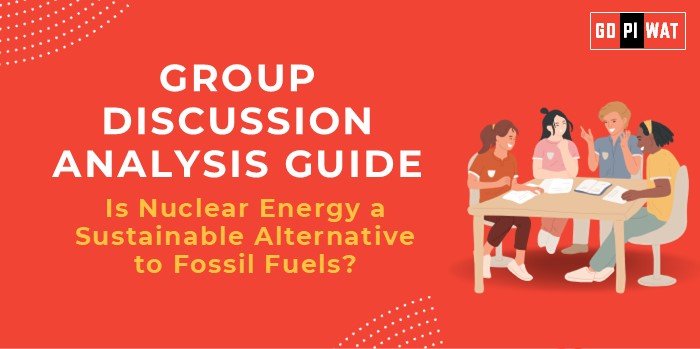📋 Group Discussion (GD) Analysis Guide
🌐 Is Nuclear Energy a Sustainable Alternative to Fossil Fuels?
💡 Introduction to Nuclear Energy and Sustainability
- 📖 Opening Context: “As global energy demands surge and climate concerns mount, the search for sustainable energy alternatives has intensified. Nuclear energy, long seen as a controversial power source, presents a compelling yet polarizing option in the transition from fossil fuels.”
- 📜 Topic Background: Nuclear energy was first commercialized in the mid-20th century, with the promise of being a clean, reliable energy source. However, concerns about safety, waste management, and high costs have tempered its adoption despite its low-carbon footprint.
📊 Quick Facts and Key Statistics
- 🌍 Global Nuclear Energy Contribution: Supplies ~10% of the world’s electricity, with over 440 reactors operating globally.
- ♻️ CO2 Emissions: Generates electricity with negligible CO2 emissions, comparable to wind and solar energy.
- ⚡ Energy Efficiency: A single uranium pellet produces the same energy as a ton of coal.
- 📈 Global Trends: Countries like France generate ~70% of their electricity from nuclear, while Germany plans to phase it out entirely by 2025.
🌟 Stakeholders and Their Roles
- 🏛️ Governments: Define nuclear policies, oversee safety regulations, and fund research.
- 🏢 Private Companies: Invest in reactor construction and uranium mining.
- 🌐 International Agencies: Ensure nuclear safety and non-proliferation (e.g., IAEA).
- 🌿 Environmental Groups: Advocate for or against nuclear energy based on its ecological impact.
- 👥 Citizens: Contribute to public perception and acceptance of nuclear projects.
📈 Achievements and Challenges
🏆 Achievements
- ✅ Reliable Energy Supply: Provides baseload power unaffected by weather conditions.
- ✅ Low Carbon Emissions: Helps achieve global climate targets like net-zero emissions.
- ✅ Technological Advances: Next-gen reactors (e.g., Small Modular Reactors, SMRs) improve safety and reduce costs.
- ✅ Global Leadership: France exemplifies a successful nuclear-powered economy.
⚠️ Challenges
- 🚧 Waste Management: Long-lived radioactive waste requires secure storage for millennia.
- 🚧 High Costs: Nuclear plants have high upfront capital and decommissioning costs.
- 🚧 Safety Risks: Incidents like Chernobyl and Fukushima underscore potential dangers.
- 🚧 Public Resistance: Social opposition due to perceived risks and environmental impact.
🌍 Global Comparisons
- 🇫🇷 France: Efficient energy system reliant on nuclear.
- 🇩🇪 Germany: Emphasizes renewables over nuclear post-Fukushima.
🗣️ Structured Arguments for Discussion
- 👍 Supporting Stance: “Nuclear energy is indispensable for achieving net-zero carbon emissions while meeting growing energy demands.”
- 👎 Opposing Stance: “The risks and costs of nuclear energy far outweigh its benefits, making renewables a safer, more sustainable alternative.”
- ⚖️ Balanced Perspective: “While nuclear energy is a vital component of a low-carbon future, addressing its safety, cost, and waste challenges is imperative for sustainability.”
💬 Effective Discussion Approaches
- 📈 Opening Approaches:
- Statistical Start: “With over 10% of the world’s electricity generated by nuclear, its role in clean energy is undeniable.”
- Contrast Approach: “While France relies on nuclear for 70% of its electricity, Germany has opted for a nuclear-free future.”
- Case Study: “The Fukushima disaster reshaped global perceptions of nuclear energy, illustrating both its potential and its risks.”
- ⚡ Counter-Argument Handling:
- Acknowledge valid points about risks or costs.
- Highlight safety innovations like SMRs and international oversight.
📋 Strategic Analysis of Strengths and Weaknesses
- 💪 Strengths: Low emissions, reliable power, high energy density.
- ⚡ Weaknesses: High costs, long waste management timelines.
- 🌟 Opportunities: Advanced reactors, international cooperation.
- ⚠️ Threats: Accidents, political resistance.
📚 Connecting with B-School Applications
- 🌏 Real-World Applications: Integrates into projects on sustainability, energy economics, and policy frameworks.
- 📋 Sample Interview Questions:
- “What role does nuclear energy play in achieving net-zero goals?”
- “Compare nuclear and renewable energy as sustainable options.”
- 💡 Insights for B-School Students: Highlights innovation management, risk assessment, and environmental policy.


